Badass Women of History--Octavia the Younger
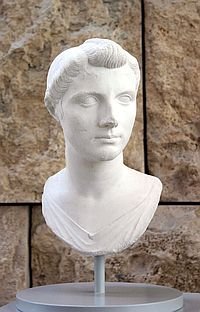
Hooray, organization! I'm using an editorial calendar now, and Badass Women of History posts will be on Mondays from here on out. Watch this space on Mondays if you enjoy the tales of these badass, ahead of their time women.
Are you into ancient Roman history? If you weren't before, you are about to be. Sit back and learn the fascinating tale of Octavia the Younger.
Who Was Octavia the Younger, and Why is She Famous?
Octavia the Younger isn't just historically famous; she was famous in her own time. In fact, she was the most well-known woman in ancient Rome, both during her lifetime, and for centuries afterward.
Born in 69 BC, she was the daughter of Gaius Octavius and Atia Balba Caesonia; her mother, Atia, was the niece of Julius Caesar. As such, she was, from the beginning, part of a well-known family of Roman leaders. Her father, for example, was a Roman governor and senator. He died when Octavia was ten years old, and her mother re-married the Roman consul Lucius Marcius Philippus.
Octavia had an elder half-sister through her father's first marriage, and that sister was known as Octavia the Elder, or Octavia Major. This was in keeping with the Roman tradition of naming all children after their fathers, regardless of gender.
Octavia the Younger also had a younger full brother named Octavian. Octavian would later come to be the first Roman Emperor, calling himself Caesar Augustus. Octavian was emperor of Rome during the time Jesus of Nazareth was born and was still on the throne when Jesus began his ministry and was crucified. He was the Roman Emperor for most of the events of the New Testament, actually.
It wasn't her connections to such powerful and historically well-known people that made Octavia the Younger so badass, though.
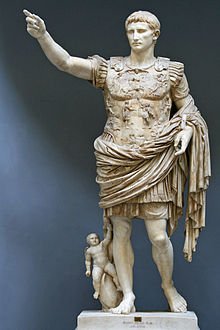
(Octavia's younger brother, Octavian, aka Emperor Caesar Augustus)
Octavia's First Marriage, and Her First Act of Defiance
As a noblewoman, Octavia didn't have a whole lot of control over her life, as most of that was decided for her by others. First, by her mother, then later, by her younger brother, the Emperor. Still, what little actual power she wielded on her own, she used shrewdly and well.
She was married to another Roman consul, as her father had been, when she was fifteen years old....a respectable age for marrying in ancient Roman times. This was before her brother became Emperor, and a consul was considered a rank worthy of her.
Octavia and her husband, Gaius Claudius Marcellus Minor, lived happily together from the time of their marriage, until Marcellus's death when Octavia was 29.
Octavia and Marcellus had two daughters and a son together.
There was a brief time when Octavia's great-uncle, Julius Caesar, wanted them to divorce, so he could marry Octavia to his rival, Pompey, and perhaps bring a renewed peace between them. Octavia and Marcellus did not want to divorce, however, so rather than see Julius Caesar force her to divorce the husband she loved, Pompey married someone else.
That Octavia and Marcellus made their desire to stay together known, even in the face of the desires of her powerful great-uncle, showed much courage on both of their parts. The fact they won is likely what gave Octavia the courage and confidence she needed to face much more challenging situations down the road.
Octavia--The Roman Ideal of Perfect Womanhood
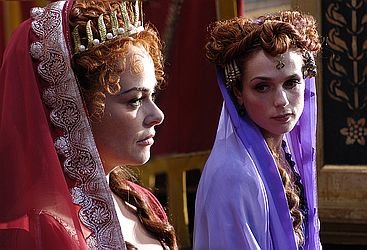
(Octavia wearing purple, and her mother, Atia, as depicted in the HBO TV series, "Rome")
The same year Marcellus died, Octavia was ordered, by a decree of the Roman senate, to marry Marc Antony as his fourth wife. This marriage was viewed as one that would likely bring tensions between Antony and Octavia's brother, Octavian, down to manageable levels, since they would then be family. Octavia was pregnant with her late husband's child at the time of the marriage to Antony.
While the marriage wasn't her idea, and Antony was known for being unfaithful to his previous wives, as well as being a bad husband in general, Octavia took her political role in this marriage seriously. Her first marriage was arranged, too, but it turned into love. This second one to Antony would be a political role her family obligations mandated she play. And, she played it well.
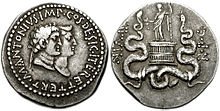
(both sides of a Roman coin bearing the images of Octavia and Antony)
She traveled extensively with Antony and her three children by Marcellus. She even had two more children with Antony, both daughters. Along with these five children, she was also given the care and raising of Antony's two sons by his previous marriages. Octavia gave every indication of being faithful and loyal to him, at least in public.
Just as people today complain about losing "traditional American values," the people of Rome were complaining of the loss of "traditional Roman values" to a more hedonistic younger generation in Octavia's time. Octavia's seeming obedience and loyalty to Antony, a man who couldn't be easy to love, was an inspiration to the nation. Octavia became the embodiment of the public idea of what an ideal Roman woman and wife should be.
Octavia was shrewdly getting the public on her side for when she knew Antony would eventually betray her.
What DID Make Octavia Such a Badass Woman?
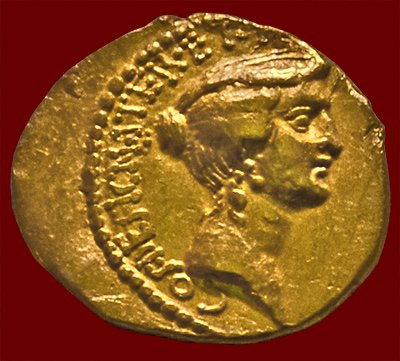
(Octavia has her OWN coin, too, and for a good reason)
Antony DID betray her, as she knew he would. After four years of marriage, Antony left Octavia for his former lover, the Egyptian Pharaoh, Cleopatra VII, who he met a year before his marriage to Octavia. And, not only did he leave her, he left their children. Roman society couldn't help but be on the side of this virtuous, wronged woman, and the peace that existed between Antony and Octavian began to break down.
Octavia returned to Rome with her children and Antony's children, and acted as a political advisor between Antony and Octavian, making a good show of doing what she could to broker peace between them. She even sent Antony troops to use in some of his military activities in trying to gain control of strategic lands in the east from Octavian. Antony responded to this act of graciousness by divorcing her the next year.
After this, most of Roman society was firmly on Octavia's side.
Octavia watched as Antony made bad choice after bad choice following their divorce, and was eventually informed of his suicide when he realized he could not beat Octavian's forces. Because she had been such a good and faithful wife, Octavia was rewarded by being given custody of the three children Antony and Cleopatra bore together.
At this point, Octavia was raising ten children, only five of whom were her own.
Octavia spent the rest of her life as a single woman, helping her brother rule the new Roman Empire in an advisory capacity, and being generally adored by the Roman people.
Octavia the Goddess
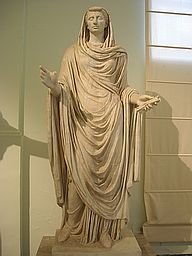
(statue of Octavia)
When Octavia died in 11 BC, the funeral was a lavish, public one in which many famous and powerful political leaders participated and gave speeches, her brother the Emperor among them.
Because of her willingness to play the part of a good and loyal wife to a lousy husband for the betterment of her family and country, Octavia not only had the adoration of the public in life, but was bestowed with a mountain of incredible honors after her death. Among the many honors she received were:
- Coins minted with her face on them. She was only the second Roman woman to have this honor (the first one being Antony's third wife, Fulvia).
- The Gate of Octavia was built in her honor by her brother.
- The Porticus Octaviae was also built by her brother in her honor.
- Octavian had the Roman senate declare Octavia to be a goddess.
This wasn't just some honorary title, either. A senatorial declaration of divinity in Roman times meant you were believed to really be lifted into godhood. Octavia was a woman to be admired in life and worshipped after death. Octavian saw to it.
Octavia was a woman of her times, one who knew what was expected of her, and she learned to take what power she could from an essentially powerless position. In doing so, she gained some control over her life, the adoration of her family and the Roman public, and a classification as a deity. That's a woman who knows how to take the hand she is dealt and play it to her best advantage.
Though never in an official position of power, Octavia was possibly the most powerful, and certainly most intelligent, Roman politician of all.

(the ruins of the Porticus Octaviae, dedicated by Emperor Octavian to Octavia)
If you enjoyed this post (and I hope you did), please take a moment to follow me here at @stephmckenzie to get more articles from me on life, the universe, and everything. Thank you!
Interesting post. I've followed you and will look forward to reading about more badass women on Mondays :)
I'm glad you liked it. Stay tuned for more. :)
This was great writing. Very strong headed woman indeed! Do give image credits though!
Hi!! This is a great read. :) Looks like we have some common interests... :) Upvoted and following you.
Thank you, @sandzat. I'm glad you liked it. I'm following you now, too. :)
This was great! Followed :)
Thank you, @nickelnerds. I'm glad you liked it. Followed back. :)
Thank you for putting great effort on writing this interesting blog :)!
You're welcome. I'm glad you liked it.
One of the unfamiliar figures for me on Roman history.
what I hate is Nero, killed a lot of Christians because of an uncontrolled fire.
Octavia was the great-grandmother of the emperor Caligula. He was pretty bad, too. Kind of crazy, and brutal to the Roman people in general.
It ran on their family.
Now we do not have empires but super-powers that destroy whole nations. >o<
great reading!!!
thanks for dropping by to my post steph ..promise to upvote after i recharge my voting powers:)
Thanks, @sandaraclark. I appreciate it.
your always welcome @stephmckenzie
Great historical treatment. I'm taking a course on Women of Ancient Rome next year and look forward to learning about figures like Octavia. The number one woman of the Roman world I want to learn more about is Zenobia.